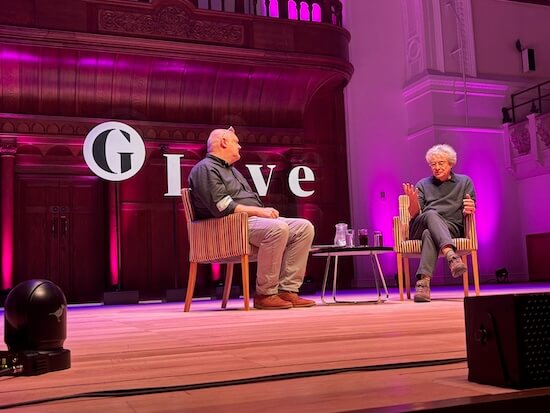
This week, I went to see Carlo Rovelli being interviewed by Dara O’Briain (best known as a comedian and host, but also a theoretical physicist). Yes, there was lots of talk about theoretical physics, but what came across most strongly for me is how passionately curious Carlo Rovelli is about the world.
I also understood from him that this is essential to being a theoretical physicist. Yes, they must deeply understand physics and the mathematics behind it, but then they use those formulas to make predictions for how the universe may be, even if we cannot (yet) observe them. TO even conceive of these predictions takes imagination, and, much like quantum physics, we know that the human mind can be imaginative, we simply don’t know how it works, but we do surmise that learning widely aids the ability to both imagine and to connect the dots.
A great example of prediction in theoretical physics is black holes. These were predicted in 1916 through some of the first work “solving” for the formulas of Einstein from his theory of general relativity published only the year before, in 1915. It then took over 100 years before we could actually observe imagery of a black hole (in 2019), and before that black holes were only broadly accepted as real and vitally important to how universes are formed as recently as the last two decades.
To even conceive of predicting something like that surely takes imagination, and to be imaginative takes a variety of thinking and voracious curiosity in learning.
This takes me back just one day to yesterday’s post, “Different forms of intelligence“, inspired by the writing of the great Elif Shafak, who celebrates fiction writing as a way to understand our fellow humans. I would LOVE to attend a dinner party with Carlo Rovelli and Elif Shafak as guests and simply listen to the two of them talk. What a treat that would be!
I leave you with these thoughts from the wonderfully attractively titled earlier book by Rovelli “There Are Places in the World Where Rules Are Less Important Than Kindness” :
Poetry and science are both manifestations of the spirit that creates new ways of thinking the world, in order to understand it better. Great science and great poetry are both visionary, and sometimes may arrive at the same insights. The culture of today that keeps science and poetry so far apart is essentially foolish, to my way of thinking, because it makes us less able to see the complexity and the beauty of the world as revealed by both.
and
Einstein did not just wake up one morning thinking that nothing was faster than light, nor did Copernicus simply think up the idea that the Earth orbits the sun, Darwin that species evolve. New ideas do not just fall from the sky. They are born from a deep immersion in contemporary knowledge. From making that knowledge intensely your own, to the point where you are living immersed in it, from endlessly turning over the unanswered questions, trying all roads to a solution, then again trying all roads to a solution, and then trying all those roads again. Until there, where we least expected it we discover a gap, a fissure, a way through, something that no body had noticed before, but that is not in contradiction with what we know, something miniscule on which to exert leverage, to scratch the smooth, and unreliable edge of our unfathomable ignorance, to open a breach onto new territory.
As always, whenever I read Carlo Rovelli, I am left with one word coming to mind, “Beautiful”!
